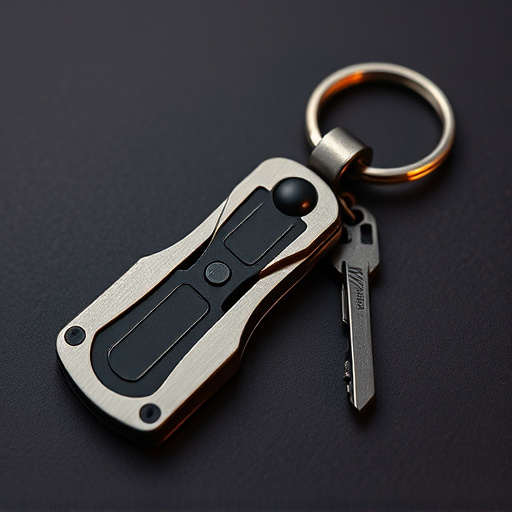Personal alarm keychains, popular for self-defense, emit loud decibels (up to 120dB) to deter attackers and attract help. Legal in many US states without permit, they require compliance with local laws regarding decibel levels, design, and functionality. Recent changes in state laws allow open carry of such devices, but advocates and critics debate their impact on community safety. These keychains offer affordable personal safety for isolated or risky environments, but users must understand their limitations and local regulations.
In today’s world, personal safety is paramount. Protective keyring devices, including powerful personal alarm keychains with loud decibels, offer an accessible self-defense solution. This comprehensive guide explores the legal landscape of carrying these devices across the US, highlighting states where high-decibel alarms are permitted by law. We delve into the benefits, considerations, and legal requirements, empowering individuals to make informed decisions about personal safety while navigating various jurisdictions.
- Understanding Protective Keyring Devices in the US
- Legal Requirements for Personal Alarm Keychains
- States Allowing Loud Decibel Carry
- Benefits and Considerations for Carrying a Keychain Alarm
Understanding Protective Keyring Devices in the US
Protective keyring devices, also known as personal alarm keychains, have gained popularity across the United States as a means of self-defense for individuals concerned about their safety while on the go. These compact and discreet tools emit loud decibels, often up to 120dB, when activated, creating a startling noise that can deter potential attackers and attract attention from bystanders.
In many states, carrying a personal alarm keychain is legal without a permit or license, making it easily accessible for individuals seeking an affordable and effective self-defense option. The legality varies across the country, so it’s essential to check local laws before purchasing or carrying one. With a simple click or twist, these devices can transform into a powerful tool to protect oneself in various situations, from late-night walks home to unexpected encounters.
Legal Requirements for Personal Alarm Keychains
In many jurisdictions, personal alarm keychains are subject to specific legal requirements designed to ensure their responsible use. One of the primary considerations is the device’s decibel level. Personal Alarm Keychains aimed at self-defense must emit loud sounds, typically above 120 decibels (dB), to attract attention and deter potential attackers. This requirement varies by state or region, with some areas setting a minimum threshold of 90 dB or higher.
Additionally, legal regulations often dictate the overall design and functionality of these keychains. They may mandate that the alarm be easily accessible and activated, requiring a simple trigger mechanism to ensure quick response times during an emergency. Compliance with local laws is crucial for individuals carrying personal alarm keychains to avoid any legal repercussions.
States Allowing Loud Decibel Carry
Several US states have recently updated their laws to permit the open carry of firearms, including personal alarm keychains with loud decibels as a form of self-defense. This shift in legislation has sparked debates among citizens and law enforcement, particularly regarding public safety and the potential risks associated with widely accessible personal alarms.
Keyring devices equipped with high-decibel alarms offer an easy-to-carry solution for individuals seeking protection. States like Texas, Idaho, and Utah have removed restrictions on these devices, allowing citizens to legally possess them in public places. However, critics argue that the presence of such loud alarms could lead to unnecessary panic and misidentification, especially in crowded areas. As a result, it’s crucial for states considering such laws to balance personal safety measures with community well-being.
Benefits and Considerations for Carrying a Keychain Alarm
Carrying a personal alarm keychain can offer several advantages for individuals seeking enhanced personal safety, especially in potentially dangerous situations. These compact devices are designed to emit a loud alarm with high decibels, immediately drawing attention and alerting bystanders when activated. This simple yet effective tool can serve as a deterrent to potential assailants, providing valuable time for escape or the arrival of help.
When considering the use of a keychain alarm, users should be mindful of local laws and regulations regarding self-defense devices. Some states have specific rules on where and how such alarms can be carried. Additionally, understanding the range and reliability of the device is crucial; while loud alarms can startle an attacker, they may not always guarantee a safe outcome. Nevertheless, as a cost-effective and easily accessible personal safety measure, keychain alarms can offer peace of mind for individuals who frequently find themselves in isolated or potentially risky environments.
Protective keyring devices, especially those with personal alarm functionalities, offer enhanced security for individuals in various settings. Understanding the legal requirements and decibel limits in different states is crucial for responsible carry. With many US states permitting loud decibel personal alarms, these keychains provide a convenient and effective way to deter potential threats. Always consider local laws and benefits like portability and discretion when choosing to carry a protective keychain alarm.
